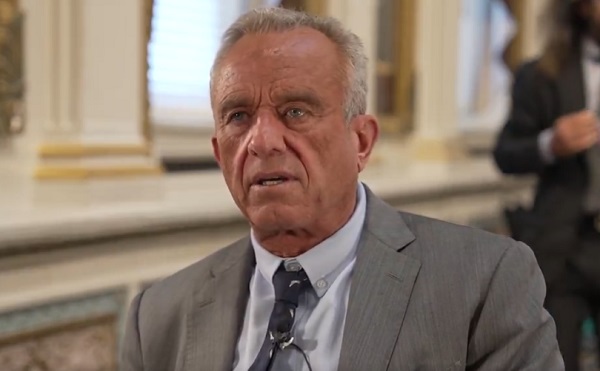Opinion
Olympics approves two men to box against women

From LifeSiteNews
The Olympic Committee approved two male boxers to fight as ‘women’ after previously failing gender tests and being disqualified for having male chromosomes: Lin Yu-Ting of Taiwan and Imane Khelif of Algeria.
“This is France!” Emmanuel Macron crowed on X as the Olympic Opening Ceremony in Paris unfolded. That, unfortunately, was what everyone was afraid of.
The ceremony featured a blasphemous representation of the Last Supper, featuring drag queens as the disciples and Barbara Butch, an overweight lesbian DJ, as the Lord Jesus Christ. The International Olympics Committee has already issued a pseudo-apology and deleted the video from its YouTube channel, but Butch was quite clear that this was a deliberate inversion.
There was more, but suffice it to say that after that ceremony, it is no surprise that the Olympic Committee has approved two male athletes to compete as “women” who were previously disqualified from the Women’s World Boxing Championships in March 2023 in New Delhi, India, for having “XY chromosomes”: Lin Yu-Ting of Taiwan and Imane Khelif of Algeria. At the time, president of the International Boxing Association (IBA) Umar Kremley announced that a number of boxers were being disqualified after “a series of DNA-tests” conducted “uncovered athletes who were trying to fool their colleagues and pretend to be women.”
IBA released a public statement announcing that “a boxer from Algeria, Imane Khelif, was excluded from the IBA World Boxing Championships due to the failure to meet the IBA eligibility criteria.” The Algerian Olympic Committee called the IBA’s decision a “conspiracy” to deny Algeria a gold medal and noted at the time that they hoped Khelif could fight in the Paris Olympics.
After the disqualification, Mexican boxer Brianda Tamara posted about her experience boxing Khelif at the championship on X. “When I fought with [him] I felt very out of my depth,” Tamara said. “[His] blows hurt me a lot, I don’t think I had ever felt like that in my 13 years as a boxer, nor in my sparring with men. Thank God that day I got out of the ring safely, and it’s good that they finally realized.” There are now serious concerns that female boxers could be injured by Khelif and Yu-Ting. Here is Khelif fighting in an earlier match—clearly far stronger than the opponent:
🚨Beating women is now a spectator sport
We have never been more aware as a society of male violence against women
Why are the #Olympics allowing this male to enter the boxing ring with a woman? #Paris2024 @fairplaywomen pic.twitter.com/I4gKzvigJt
— Katherine Deves Morgan 🇦🇺🚺 (@deves_katherine) July 30, 2024
Taiwan’s Lin Yu-Ting, who previously won five gold medals in women’s boxing tournaments, was also disqualified and stripped of a bronze medal. Now, at the Paris Olympics, Khelif is scheduled to fight Angela Carini of Italy on August 1, with Yu-Ting to be paired off with a female fighter the following day.
Marshi Smith of the Independent Council on Women’s Sports (ICONS) spoke with Reduxx about the issue:
The IOC’s decision to end sex-verification screening in 2000 has caused distrust and confusion in women’s sports ever since. Its 2021 decision to offload the responsibility for international eligibility criteria to individual sporting bodies has resulted in varied standards and widespread chaos among athletes, coaches, officials, and the public. In boxing, the recent contentious split between the IBA and the IOC has now placed Olympic eligibility power into the hands of national boxing federations, allowing countries like Algeria and Taiwan to set their own standards and continue placing male boxers in the ring with female athletes in combat for women’s Olympic medals.
This, said Smith, has led to a truly ugly scenario. “The physical abuse of women on an Olympic stage eliminates the integrity of all Olympic events and risks lifelong injury or even death for female athletes. This deceit cannot be allowed to continue.” A 2020 study by the University of Utah concluded that a man’s punch is, on average, about 160-170% more powerful than a woman’s punch.
Business
Labor Department cancels “America Last” spending spree spanning five continents

 MxM News
MxM News
Quick Hit:
The U.S. Department of Labor has scrapped nearly $600 million in foreign aid grants, including $10 million aimed at promoting “gender equity in the Mexican workplace.”
Key Details:
-
Labor Secretary Lori Chavez-DeRemer and Deputy Secretary Keith Sonderling were credited with delivering $237 million in savings through the latest round of canceled programs.
-
Among the defunded initiatives: $12.2 million for “worker empowerment” efforts in South America, $6.25 million to improve labor rights in Central American agriculture, and $5 million to promote women’s workplace participation in West Africa.
-
The Department of Government Efficiency described the cuts as necessary to realign U.S. labor policy with national interests and applauded the elimination of all 69 international grants managed by the Bureau of International Labor Affairs.
Diving Deeper:
The U.S. Department of Labor on Wednesday canceled $577 million in foreign aid grants, including a controversial $10 million program aimed at promoting “gender equity in the Mexican workplace,” according to documents obtained by The Washington Post. The sweeping decision to terminate all 69 active international labor grants comes as part of a larger restructuring effort led by John Clark, a senior DOL official appointed during the Trump administration.
Clark directed the department’s Bureau of International Labor Affairs (ILAB) to shut down its entire grant portfolio, citing a “lack of alignment with agency priorities and national interest.” The memo explaining the cancellations was first reported by The Washington Post and highlights a broader shift in federal labor policy toward domestic-focused initiatives.
Among the eliminated grants were high-dollar projects that had drawn criticism from watchdog groups for years. These included $12.2 million designated for “worker empowerment in South America,” $6.25 million targeting labor conditions in Honduras, Guatemala, and El Salvador, and $5 million to elevate women’s workplace participation in West Africa. Other defunded programs involved $4.3 million to support foreign migrant workers in Malaysia, $3 million to improve social protections for internal migrants in Bangladesh, and $3 million to promote “safe and inclusive work environments” in Lesotho.
The Department of Government Efficiency, also involved in the review, labeled the grants as “America Last” initiatives, and pointed to the lack of measurable outcomes and limited benefits to American workers. The agency commended the leadership of Labor Secretary Lori Chavez-DeRemer and Deputy Secretary Keith Sonderling for securing $237 million in savings during this round alone.
The cuts mark the second major cost-saving move under Chavez-DeRemer’s leadership in as many weeks. Just days earlier, she canceled an additional $33 million in funding, including a $1.5 million grant focused on increasing transparency in Uzbekistan’s cotton sector. Chavez-DeRemer, a former Republican congresswoman from Oregon, was confirmed as Labor Secretary on March 11th by a bipartisan Senate vote of 67-32.
Health
RFK Jr. says ‘everything is going to change’ with CDC vaccine policy in Michael Knowles interview

From LifeSiteNews
New Health and Human Services Director Robert F. Kennedy Jr. said the CDC’s own reporting system ‘captures fewer than 1% of vaccine injuries. It’s worthless, and everybody agrees it’s worthless.’
When Michael Knowles asked new Health and Human Services (HHS) Secretary Robert F. Kennedy Jr. if anything will change regarding the public’s justifiable concern with the growth of vaccines, Kennedy quickly shot back, “Everything is going to change.”
Kennedy pointed to the Centers for Disease Control’s current flawed VAERS (Vaccine Adverse Event Reporting System) online mechanism.
By way of example, he said, “None of the vaccines that are given during the first six months of life have ever been tested for autism. The only one was the DTP vaccine. And that one study that was done, according to the Institute of Medicine, the National Academy of Sciences, found that there was a link.”
But “They threw out that study because it was based upon CDC’s surveillance system, VAERS, and they said that system is no good.”
“That begs the question, why doesn’t CDC have a functional surveillance system?” he asked. “We’re gonna make sure they do.”
“They don’t do pre-licensing safety testing for vaccines” he continued. “They’re the only product that’s exempt. So what they say is, if there are injuries, we’ll capture them afterward.”
However, “they have a system that doesn’t capture them. In fact, CDC’s own study of its own system said it captures fewer than 1% of vaccine injuries,” Kennedy said. “It’s worthless, and everybody agrees it’s worthless.”
“Why have we gone for 39 years and nobody’s fixed it?” he wondered, promising, “We’re gonna fix it.”
“We have DOGE (which) knows how to manage data. We’re going to be able to get into these databases and give answers to the American public,” Kennedy predicted.
“We’re going to have gold standard science, we’re going to follow the science, we’re going to publish all of our datasets, which CDC has never done,” he said.
“We’re going to do replication of all of our studies, which CDC has never done. We’re going to publish our peer review, which CDC has never done,” Kennedy vowed. “So people are going to have real answers for the first time.”
The new HHS head also discussed more broadly his mission after taking over the department’s helm, the mess created by the Biden administration, his job’s challenges, and recent developments thanks to DOGE.
“HHS is a $1.9 trillion agency. It’s the biggest agency in the government. And during the Biden administration, President Biden increased its budget by 38% and increased the workforce by 17%.”
“And by every metric by which we measure public health, health accelerated its decline.”
“When I came to HHS, what I found was a sprawling bureaucracy,” with functional duplication of departments, rampant redundancy and overstaffing, with various sub-agencies often acting in a territorial, self-protecting manner rather than a synergistic one.
“Perverse incentives” sometimes drive employee’s work,” he noted.
Despite his short tenure at HHS, with the help of DOGE, Kennedy has already released 20,000 “bureaucrats” from the department’s ranks.
“We’re going from 82,000 personnel to 62,000,” said Kennedy, carefully pointing out, “We’re keeping the scientists and frontline providers.”
Kennedy said that it has been really hard to fight against the problems at HHS and NIH over the last 40 years from “the outside.”
But “now I’m on the inside,” he declared. “This is the purpose of my life. It’s what I’m going to do over the next four years.”
He concluded:
President Trump promised to return the American dream to Americans.
A healthy person has a thousand dreams. A sick person only has one.
-

 Business1 day ago
Business1 day agoFeds Spent Roughly $1 Billion To Conduct Survey That Could’ve Been Done For $10,000, Musk Says
-

 2025 Federal Election2 days ago
2025 Federal Election2 days agoChinese Gangs Dominate Canada: Why Will Voters Give Liberals Another Term?
-

 Alberta16 hours ago
Alberta16 hours agoPhoto radar to be restricted to School, Playground, and Construction Zones as Alberta ends photo radar era
-

 Health19 hours ago
Health19 hours agoRFK Jr. Drops Stunning Vaccine Announcement
-

 Alberta10 hours ago
Alberta10 hours agoProvince announces plans for nine new ‘urgent care centres’ – redirecting 200,000 hospital visits
-

 Business8 hours ago
Business8 hours agoElon Musk, DOGE officials reveal ‘astonishing’ government waste, fraud in viral interview
-

 Energy2 days ago
Energy2 days agoEnergy, climate, and economics — A smarter path for Canada
-

 2025 Federal Election2 days ago
2025 Federal Election2 days agoFool Me Once: The Cost of Carney–Trudeau Tax Games






